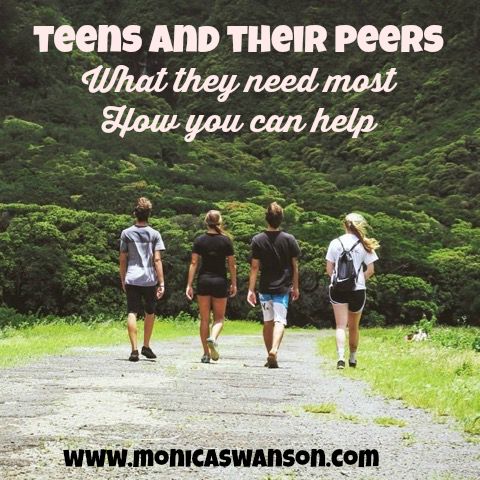Teens and Peers: What They Need Most, and How You Can Help
Welcome to Part FIVE of my all things teen boy series. If you need to catch up, find the lineup here:
INTRO, Preparing for Puberty, Kids and Porn, What to Expect in Puberty, Teens and Dating.
Whew! We’ve covered a lot, haven’t we?
Today I will talk about teenagers and their peer relationships. I know this is a big topic, and one blog post is not enough to cover it all, but we’ll at least scratch the surface, ok?!
*Side note: Feel free to substitute “daughter” for “son” throughout this post. I’m referring to boys because that’s the theme of this series, but this one…is relevant to all teens. (pst: Spread the word! 🙂 )
^^photo credit: Grace Rebekah (follow her insta feed @girlwiththeredballoon)
I don’t know about you, but I remember well my own teenage years, and can still nearly feel the range of emotions that were part of them. I made some good, and some very bad decisions during my teen years, and peer issues were a huge factor in both. I went to public schools growing up, as did my husband. Later we worked with teens in public schools through coaching (Dave,) teaching, (me,) and leading a youth group for many years (both of us.) Now, of course, we are raising two teenage boys of our own, and have two more just behind them.
So yes, the teen years are near to my heart in many ways.
Now before I dive into what I consider the most important issue of the teen years, I want to touch on a foundational topic:
The Parent-Kid Connection.
Ideally you have stayed in a good relationship with your son during his pre-teen years. You have prepared him for the changes and challenges of his teen years. You have developed a mutually respectful and trusting relationship with your son.
And if you haven’t? Well, the good news is: most experts agree that teens are usually willing (dare I say eager) to build a relationship with you now. If you come to them in humility and with respect, they will likely be very open.
This connection is important so that your son knows he has a safe place to bring questions…even fears or insecurities. Make it clear you are there to support him. And if he doesn’t bring things up, I encourage you to bring them up for him.
Because I always believe it is best to… Talk about issues before they are issues.
And one of the most important things you can talk about is something that affects all human beings, but is one of the greatest issues of the teenage years…
THE NEED FOR ACCEPTANCE
Teenagers are motived to a huge degree by the feeling of acceptance. If they think that doing something, saying something, or being with a certain crowd of people will make them feel like “one of the guys,” or “cool,” or like they simply belong, they will be very motivated to do it. Even if it is risky. Even if it goes against a value or moral that they have known growing up.
So talk about it. Affirm your son’s feelings, and listen if he is is willing to talk.
Then consider these three ways you can help your son with his need for acceptance.
First:
Help your son develop a sense of identity and to feel secure in it. Having a secure sense of self is probably the most important preparation a kid can have for his teen years. A kid who is secure in himself will have the best chances of seeking out positive peer situations and enjoying his teenage years.
As for our family…Our boys have each found their self worth and a deep sense of security in their relationship with God. Sure, they’ll still want to be accepted by peers, and it will sting if they feel left out, but it’s pretty cool to see their identity is built on something so secure. Deep down they know that their life has purpose and they are loved. Nothing will change that.
Second:
Help your teens feel like they belong in your family. Sometimes, with all of the hormones and inner turmoil, teens will feel like their parents are picking on them to the extent that they feel rejected. They may begin to isolate themselves from their own families. Though there is a natural increase in outside relationships as a kid grows up, I highly recommend parents not let this go unchecked. Instead, sit down with your teen and make sure that you speak words of love and acceptance to them. Your unconditional love and support for your son is crucial. They must know that they are accepted at home and that your family is incomplete without them.
Third:
Help your teens get involved in positive peer groups and in healthy activities. Sports teams, youth groups, choir, band, robotics clubs, and so on….These are all places we can help our kids get plugged into that will be likely to give them healthy relationships and positive role models. Will they be perfect? No. But combined with a family that supports them and makes them feel like they belong, these outside groups should be a really great place for kids to develop friendships and grow in independence.
THE GOOD NEWS IS…If these three things are in place, you may find that your teen never goes through any serious peer-related drama. In fact, similar to my post on teens and dating, you might find that it’s almost a non-issue.
(Seriously! Young families–that’s really good news!)
A teenager who is secure in himself, feels accepted at home, and is plugged into healthy outside activities will likely do just fine though his teen years. Peer pressure may not even be an issue, because he will choose to spend time with kids who are a positive influence, and stay away from situations that could be harmful. He may admire and model himself after older kids and young adults who are awesome role models. He may never be interested in getting involved with kids who are drinking, doing drugs, or getting involved sexually because he’s busy doing good things with good people that make him feel…good.
HOWEVER…Some of you are doing your best in all of these ways, and still your son is drawn to hang out with kids who you do not feel good about.
People have asked me: Is there really anything we can do about it?
Yes, I believe there is.
It begins by embracing your role. You are parents. It is not your job to be your kid’s best friend. It is your job to set rules, establish boundaries, and be clear about your expectations. For example: You can say no to your son spending time at a certain friend’s house if you don’t feel comfortable about it, or spending time anywhere you aren’t comfortable with. For these short years that your son is in your home, make sure you parent with wisdom and diligence.
Will they always love what you are saying? No.
So?
They will thank you later.
You have a greater influence on your kid’s choices than you might realize.
An article at WebMD shares some helpful tips on parenting in the teen years. Tom Hedrick, founding member of The Partnership for a Drug-Free America says that from his experience, not wanting to disappoint their parents is actually a very important barrier to teens making bad decisions.
See — They really do want to please you. (even if they hide it well!)
Here’s a little more advice for parents on teens and social pressures from the WebMD article:
Take Time to Connect and Talk With Your Teen
Being a teenager is often a dance of push and pull. “Adolescents want to be independent and dependent at the same time,” says Benjamin Siegel, MD, pediatrician and fellow of the American Academy of Pediatrics’ committee on the psychosocial aspects of child & family health. “On one hand, they want to assert their independence. On the other, they need their parents.”
Your teen probably feels intense pressure to fit in. She may not know how to talk about it. She may not talk much at all. It may take extra effort to connect with her, but chances are she hopes you will. “The more we understand what kids are going through, the more empathic we can be towards them,” says Siegel.
Be the ‘Bad’ Guy
Your rules and structure give your teen a framework for understanding the world, even if he protests. When Wallace asks teens what their parents could do to discourage drinking, the answers were surprisingly simple:
- Talk to us. Teens say they want to know what their parents think and how they make decisions.
- Punish us. Teens who break rules typically wait to see what happens. If there are no consequences, the rules don’t matter.
- Limit overnight visits. Not having to go home can be too much freedom to handle.
- Wait up for us. Knowing they have to face mom or dad, or both, in a few hours makes most teens think twice about the shape they’ll be in when they get home.
Teens want us to be involved. And they respect our thoughts and opinions more than we realize. That’s why I like to remind my boys often of the wise old saying…
SHOW ME YOUR FRIENDS AND I’LL SHOW YOU YOUR FUTURE.
Another helpful tip: Make your home the hub! If you can make your home a fun place to hang out, your kids will be more likely to bring their friends to your place. You don’t have to go crazy with fancy games or toys, just plenty of food and a happy home will do. It’s a great way to get to know your son’s friends, and you’ll likely end up with a lot of laughs too.
If your kids seem bent on hanging out with friends who are a bad influence, you need to consider your options as a family. Family therapy may be really helpful. You might consider homeschooling, even if just for a season. Your kids’ life and future are worth taking things really seriously.
Peer pressure. This post is crazy long, and I still have not focused on the issue of helping our kids face peer pressure. As you can tell, my heart’s desire is to keep our teens in positive social settings where peer pressure is minimal, so that’s what I focused on here.
But peer pressure is a very real thing, and most of our kids will face it in one form or another. It is a big topic, worthy of its own post (or series!)
But in brief…
The first thing I recommend (warning: broken record alert…) is to talk to your kids early on about WHAT IS peer pressure. How does it present itself? What does it look like, and (maybe more importantly,) what will it FEEL like? Be honest and open with your kids about this topic, and talk talk talk about it before they face it.
Next, help your kids create a game plan. Experts suggest role-playing situations that your teen might face. Let them practice saying no, or escaping a situation that they truly do not want to be in. Just showing them that you are aware of the realities of their peer scene will make them trust you all the more. Let them blame you when they need an excuse (“My mom would kill me!”) If they have actually gone through the steps in role-playing, they will be more likely to follow through when they face the real situation.
Bottom line: If your teen knows that you are on their side…That you are cheering for them and you believe in them, they are much more likely to make good friends, and positive life choices.
You can do this parents. Keep pressing on, and enjoy those teens!
Do you have a question, an experience to share, or anything to encourage other parents? Share in comments! If nothing else, I’d love to hear the age range of your children as this helps me know my audience’s needs for future posts! Thank you!
Also, if this post has blessed you, please pass it on to your friends using the social media share buttons below!
With Aloha,
Monica
PS: Please understand: I realize that this post didn’t get to even touch on some major hot topics related to teens and peers: Bullying, social media, and much more related to peer pressure, just to name a few. Each of these things would require a post of their own. Please let me know what topics you would like more on if I were to add to the series. ALSO: For the last post in my series I will be doing a teen/pre-teen Q and A session! So continue to leave questions or requests using the “contact form” or right here in comments!



My 13 year old nephew is having problems with his best friends ignoring him at times & he doesn’t understand why? My nephew & the two other boys have lived in the same neighborhood since the were toddlers…They are involved in sports, other activities, get good grades & get along most of the time but with there being three of them my nephew sometimes feels left out. Sometimes it seems to be because my nephew is not yet interested in having a girlfriend(My nephew has had girlfriends in the past but told me he wants to continue being a kid and have fun rather than have to call & check in all the time LOL 🙂 ) but the other boys are, & sometimes they ignore him & leave him out of things for no apparent reason? Like I said they seem to get along most of the time but I would appreciate any suggestions on how I can help him when they do ignore him. Thank you so much!!
Wanted to send a quick thank you. I have been sharing your teen boys posts on Facebook. The other night a friend of mine shared about encountering a hard situation with her 17 year old son. She turned to me and said that she’d been reading the posts I’d shared and felt like because of them she came into this situation with a tool belt that she otherwise wouldn’t have had. And it was very clear from the way she talked about how she handled this situation compared to how she has handled others in the past that this made a big difference. I just about cried to see the growth in her and at the hope it gave me for this young man. Thank you!
Katie–I want to thank YOU for that encouraging story. Wow, seriously made my day. Bless you for sharing and give your friend some big high fives from one mom on the journey, to another. So happy. Really, thank you!
I have a 14 yr old son in 8th grade who has anxiety and depression issues. He is on an antidepressant and is in counseling. He has no friends to hang out with but will sit and talk (a little) with one boy at lunch at school. Do you have anything to help me help him with his anxiety? Thank you.
Thank you for commenting Kristy. I know you are not alone–this is more common than you (or your son) might think! I would really recommend you talk to a professional therapist, since this is not my specialty. I don’t know all of the details of your son’s situation, but certainly I would still suggest you try to help him plug into a youth group, team or other social setting that is non-threatening and welcoming. You might have to do some research or ask around to other parents to see what is available. All the best to you! aloha-
Wow! Very good food for thought! Sharing with all my fellow moms of teens 🙂 Thank you Monica! Keep ’em coming! 🙂 xo
My questions are for your teens:
What is the one thing you think parents need to understand about teens?
If you want to be supportive of your teen, always ________________ and never __________________.
Just curious if your guys would share their thoughts right from the middle of the teen years. Of course I understand if that feels too public for them…
Awesome Shannon! Thank you. I’ll give it a go and see if they play. 😉
Look for this and more in my q and a post! Aloha to you and keep being awesome!
My boys are 12 and 14, this couldn’t be more perfect for us. Thank you Monica. Also, you would really enjoy someone who came to speak at my sons high school this month, Tyler Durman. I bought his book: “counter intuitive” what 4 million teenagers wish we knew… It is great, he is great. Funny, light hearted, touches on a lot of the things you mention here. He is also Christian and I feel you would really like what he had to say on this topic of teens. I highly recommend it! His website is: http://www.bswisdom.com Stands for bite-sized wisdom! Thank you as always Monica! ~Jana
Thank you Jana! So glad to hear it.
I have never heard of Tyler Durman, but I’ll check out his site now! (haha, bswisdom. so funny.)
Much aloha to you!
Monica! This is excellent! I feel like my first three turned out great but we are struggling with the last one. This is such a great reminder and so encouraging even to an old veteran mom like me 😉
Hugs